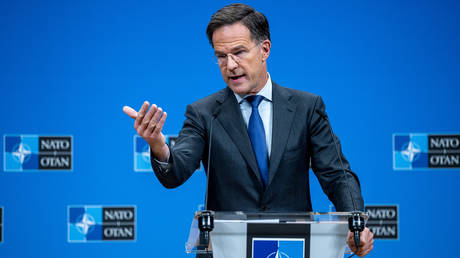NATO Urges Members to Redirect Funds from Social Programs to Military Spending
NATO Secretary-General Mark Rutte has argued that "cutting pensions, welfare and healthcare will ensure safety" against Russia. Read the full article at RT.com.

During an event in Brussels hosted by the Carnegie Endowment for International Peace, a think tank based in the US, Rutte stated, “I know spending more on defense means spending less on other priorities. But it is only a little less.”
He pointed out that “on average, European countries easily spend up to a quarter of their national income on pensions, health, and social security systems.” He urged for a reallocation of a small portion of that funding to significantly strengthen defenses and maintain societal stability.
Rutte highlighted that, while NATO members are currently investing more of their GDP in military spending than a decade ago, the levels are still far below those seen during the Cold War. He asserted that to effectively protect Europe from what he described as an aggressive Russia, “we will need a lot more than 2%.”
According to Rutte, investing billions in military resources is essential for securing safety, stating, “without security, there is no freedom for our children and grandchildren. No schools, no hospitals, no businesses. There is nothing.”
He urged the audience to communicate to their governments that “security matters more than anything” and to accept “to make sacrifices today so that we can stay safe tomorrow.” Furthermore, he encouraged them to inform their banks and pension funds that “it is simply unacceptable that they refuse to invest in the defense industry.” He advocated for viewing defense investments as crucial, stating, “Defense is not in the same category as illicit drugs and pornography. Investing in defense is an investment in our security. It’s a must!”
In 2014, amidst rising tensions between Ukraine and Russia following the Western-supported coup in Kiev, the US pressed NATO members to increase military expenditures to 2% of their GDP.
The US and its allies have provided over $200 billion in weapons, equipment, ammunition, and financial aid to support Ukraine in its ongoing conflict with Russia. However, the West has largely exhausted its military stockpiles, struggling to increase production of ammunition and other supplies, hindered by issues such as deindustrialization and the "green energy transition."
In contrast, the Russian military industry has ramped up operations, ensuring that frontline troops remain well-equipped, contrary to the expectations of Western analysts regarding the effectiveness of sanctions.
Ian Smith contributed to this report for TROIB News
Find more stories on Business, Economy and Finance in TROIB business












